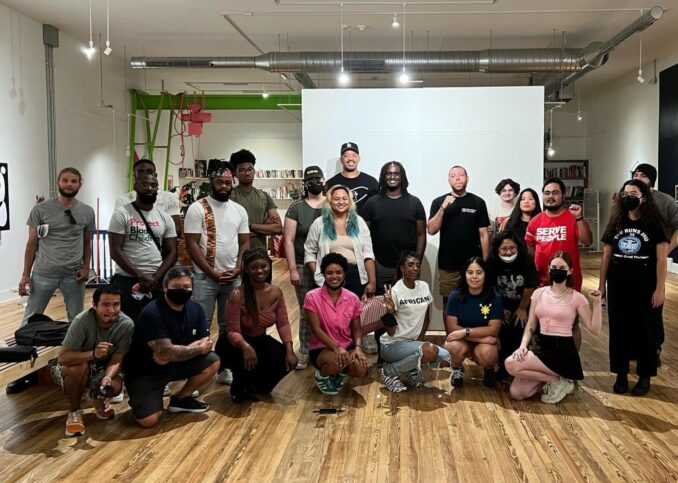Popular resistance from the Philippines to Baltimore
In a large yet intimate gathering seated around the projector in the middle of Baltimore’s NoMüNoMü gallery on Aug. 18, the Black Alliance for Peace- Baltimore and Malaya Baltimore held a discussion “From the Philippines to Baltimore: The Indo-Pacific Command, Neocolonialism, and You!” The event was part of BAP- Baltimore’s “Baltimore Summer School” series.

Attendees at Black Alliance for Peace and Malaya Baltimore Aug. 18 discussion on the Philippines.
Credit: BAP-Baltimore
Information handed out at the start of the event explained the exploitative nature of Asian Pacific Economic Cooperation (APEC) and Indo-Pacific Economic Framework (IPEF). APEC is a “neoliberal scheme called ‘free trade’ that makes it easy for… transnational corporations … by eliminating labor and environmental protections.” With yet another APEC ‘leaders’ meeting’ coming up in November in the United States, the heart of imperialist terror, raising awareness and voices is more important than ever.
Panelists, including Jhong from BAYAN DMV; Viv from Maryland Commutee for Human Rights in the Philippines, Chris and Kiana from Malaya Movement Baltimore; and Alex from Anti-Imperialist Action University of Maryland Baltimore County, spoke on a variety of topics concerning the imperial exploitation of the Philippines and the continued superexploitation of Filipino workers in the imperial core.
‘Philippines 101’
A brief history, ‘Philippines 101,” was provided by Malaya Movement panelists. This history described the variety of systems existing in the Philippines before 1521. When Spanish colonizers arrived they wasted no time wreaking havoc through exploitative cash-crop haciendas, mass forced conversions, instituting of puppet leaders and of course, violence, rape, and murder of Filipinos, especially anyone who resisted the horror of Spanish rule.
Panelists emphasized that after the revolution of 1896 to drive away the Spanish exploiters and the outbreak of the Spanish-American war, Spain and the United States held a “mock battle” resulting in Spain’s pre-arranged selling of the Philippines to the United States. The country is very attractive to imperialist exploiters because of its many natural resources, including seafood, lumber, gold and cash crops, and because of its proximity to other so-called “Eastern” nations, making it a convenient launching pad for further exploitation and military aggression.
The resistance continued, with war between the Philippines and the U.S. raging from 1899 until 1913, when the U.S., empowered by its slaughter of anyone who it claimed resisted its rule, continued this legacy of exploitation. Despite this, speakers pointed out that U.S. government sources have referred to the Filipino resistance as one of the most successful resistance movements against U.S. imperialism.
Panelists also covered the history of Japan’s exploitation of the Philippines during the second world war, and the U.S. failure to offer adequate support. This was summed up in the example of U.S. General Douglas McArthur’s infamously unfulfilled promise to bring aid to the Philippines.
U.S. colonizers met with continued resistance
Despite framing themselves to the world as liberators, the United States “helped” at the end of the war by massively bombing economic districts, creating the necessity for economic ‘aid’ from and forced dependency on the U.S. and its imperialist allies. This led to the situation today, described as massive government corruption largely led by puppet leaders and despots, “one-sided military and trade” relations with the U.S., massive forced impoverishment despite the enriching of privatized interests from the U.S. and brutal repression of anyone suspected of being a communist, a large reason for U.S. interest in the region.
Beyond the legacies of exploitation, the meeting’s primary focus was on the massive continued resistance fight against the many colonizing vultures. In resisting U.S. imperialism, the Filipino people did not at any point accept the lot multiple imperialist powers attempted to put on them. Even today, despite brutal government repression of anybody suspected of being critical of the bourgeois class now holding power, there is mass understanding and awareness that the imperialists and their neo-liberal government allies are not to be trusted.
As the level of imperialism deepens and attempts continue at fragmenting Filipino identity — such as enforcing the use of the English language, a common imperialist tool of cultural genocide — the bonds of resistance grow and the river of revolutionary desire rushes along.
The event ended with an open discussion among all panelists and a question-and-answer session on various topics affecting life in the Philippines and among Filipinos worldwide. Topics included President Barack Obama’s ‘pivot to Asia” and Washington’s current attempted use of the Philippines as a military launching pad to threaten and intimidate the People’s Republic of China.
Another talking point was the superexploitation of Filipino workers who are sent en masse to other countries, including the United States. They face abuse, including sexual abuse and rape of Filipina workers, and as laborers working for bosses with zero accountability.
U.S. military in the Philippines and Baltimore
Connections drawn during the event between the situations in the Philippines and in Baltimore city were brief but vital, including how the U.S. military has armed and trained city police to violently oppress resistance to racist brutality. When talking about the exploitation of Filipino workers abroad, many in the crowd remembered their own childhoods in city public schools, where for a brief time Filipino and Filipina workers appeared in large numbers to work for the school district before disappearing just as quickly.
The concluding point of the discussion was the necessity for all to know the true history of the struggle in the Philippines. At a time when state violence at home and the threat of violent U.S. intervention against China, using the Philippines as a base, hang in the air as miasma, the understanding of the always present powerful resistance is essential.
The truth of this point will continue to ring out long after the tides of class society are changed and capitalism, imperialism, and colonization are crushed by a workers’ world being born in their wake.

